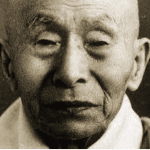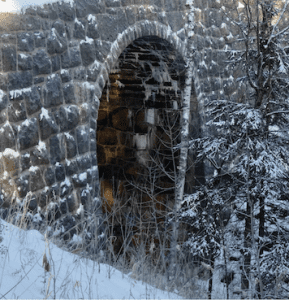Below you will find a dharma talk by an incredible (and largely unknown) Zen master, Miàodào Dǐngguāng (1095-1170), one of only three women Zen masters listed in Outline of the Linked Flames, a transmission of illumination collection published in 1183.
Miàodào had been a student of the Cáodòng (J. Sōtō) master Zhenxie Qingliao (1088-1151; Tall Reeds Purity Field; J. Choro Seiryō), but after twenty years of training had not awakened. She switched teachers and began working with the Línjì master Dàhuì Zōnggǎo (1089–1163) and soon awakened by means of the “not mind, not buddha, not a thing” keyword.
Miàodào was Dàhuì’s first student who kenshō-ed and due to the success of his keyword method with her, he began using it with everyone – and thirteen monks awakened the following year.
So Miàodào played a key – and largely unsung – role in the development of the keyword method. Dàhuì, however, was very supportive, frequently telling her awakening story, and using her example as proof that women as well as men could awaken. In addition, Miàodào became Dàhuì’s first successor. He continued to support her and her students as they trained together by sharing written and oral teachings with them.
Much more about Miàodào is available in an article by the wonderful Miriam Levering, “Miao-tao and Her Teacher Ta-hui.”
Click here to support my Zen teaching practice at Patreon of which translations and writings like this are one facet. You will also find an advertisement free version of this post there.
As a Zen master, Miàodào was extraordinary – as you will see for yourself below. The style of her dharma expression reminds me of Dōgen. However, Miàodào predated the old dog by almost a century, so I should say that Dōgen reminds me of Miàodào. In the passage below, you will find several phrases that Dōgen used, like “churn the Yangtze River into curds and transform the great earth into gold….”
There’s also a dharma hall discourse in Dogen’s Extensive Record (#266) that has a very similar and playful structure to the first portion of this Miàodào dharma talk, so much so that I wonder if Dōgen was familiar with Miàodào’s teaching (he certainly knew the Outline of the Linked Flames) and even if he might have imitated her.
Hey, Dōgen, how about some citations!?
Those pesky citations, however, are a modern thing and Dōgen was a master at the unattributed copy/paste, so the lack of citations for Miàodào are not unusual. That Dōgen may have been influenced by Miàodào speaks to how he may have admired her expression.
So, without further sidetracks and off-gassing, here’s Miàodào:
“If what we are talking about is a meeting between the original endowment of two people, then there is no need to ascend this high seat. But dharma s do not arise singly; their arising depends on causes and conditions. And since today the balance scal [of authority] is in my hand, I respond to whatever changes occur in the moment, grasping tight and letting loose, rolling up and rolling out, doing this with great freedom.
“There are times when on top of the solitary peak I command the essential place: This way won’t do; the opposite, not this way, also won’t do.
“There are times when in a crowded street I make a passageway: this way will do, not this way will also do.
“Then I can churn the Yangtze River into curds and transform the great earth into gold, pluck a blade of grass and make it into the sixteen-foot golden body [of Shakyamuni], take the sixteen-foot golden body and make it into a blade of grass.
“When I hold on firmly, then the three mysteries [of Linji], sword and armor, the five ranks of correct and one-sided [of Dongshan], setting the whisk upright and taking up the cudgel, being silent for a long time, and [making quick responses like] stone-struck sparks or lightning flashes – all these are not necessary.
“How even more unnecessary are words that like hooked sentences and barbed phrases disclose the point of a statement [words that are refined and beautiful like] a gathering of flowers and elegant brocades – they are only of benefit to an impractical, useless theoretical discourse.
“Therefore, it is said: ‘If one could thoroughly investigate all explanations of the mystery, it would be [as useless as] a fine hair extended across the great void [in a feeble attempt to cover it]. If one were to exhaust all the deepest principles of the world, it would be [as useless as] hurling one drop into the great ocean.’
“Moreover each person is complete in every way, each thing is perfect, and [that which is totally complete and perfect] covers the earth and reaches to heaven. Eyes are horizontal and noses are vertical. Spring courses amoung the ten thousand plants; the moon is reflected on a thousan waves. There is no lack and no excess.
“What is there to think about? What is there to deliberate about? Even if I sing such a tune, I still can’t avoid falling into irrelevancies and confusing statements.
“So I will lose no time in arriving with you at the very best, most appropriate, most opportune moment.”
She set her staff upright and said: “Do you still understand? A thousand-foot whale spouts, and vast waves fly; one clap of thunder and the storm arises.”
Dōshō Port began practicing Zen in 1977 and now co-teaches with his wife, Tetsugan Zummach Sensei, with Vine of Obstacles Zen, an online training group. Dōshō received dharma transmission from Dainin Katagiri Rōshi and inka shōmei from James Myōun Ford Rōshi in the Harada-Yasutani lineage. He is also the author of Keep Me In Your Heart a While: The Haunting Zen of Dainin Katagiri. Dōshō’s translation and commentary on The Record of Empty Hall: One Hundred Classic Koans, was published in 2021 (Shambhala). His third book, Going Through the Mystery’s One Hundred Questions, is now available. Click here to support the teaching practice of Dōshō Rōshi.














